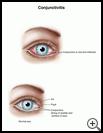
Eye Allergy (Allergic Conjunctivitis)
________________________________________________________________________
KEY POINTS
- Allergic conjunctivitis is an allergic reaction in and around your eyes.
- The first treatment is to try to avoid the things that trigger your allergy, if you know what they are.
- Treatment may include artificial tears, antihistamine or anti-inflammatory eye drops. You may need to take antihistamine or anti-inflammatory pills, especially if you have other allergy symptoms.
________________________________________________________________________
What is an eye allergy?
An eye allergy is an allergic reaction in or around your eyes. It is also called allergic conjunctivitis. Conjunctivitis is redness and swelling of the conjunctiva, which is the clear tissue that lines the inside of your eyelids and covers the white of your eye.
It is possible to develop an allergy at any time in life. If you started having allergic reactions when you were a child, you may have them the rest of your life.
What is the cause?
Allergies are a reaction your body has to things it sees as harmful. The immune system tries to protect you by making antibodies. These antibodies cause your cells to release chemicals such as histamine. Histamine causes your eyes to itch, swell, and produce more tears than is normal.
Things that cause an allergic reaction are called allergens. Pollen, cat dander, cosmetics, and smoke are examples of allergens. The allergens may be in the air, such as smoke or plant pollen. Or they might be on your hands and get into your eyes when you touch your eyes. Both eyes are usually affected unless just one eye came into contact with the allergen. This might happen with poison ivy.
People who have asthma or eczema may be more likely to have allergic conjunctivitis. Allergies tend to run in families.
What are the symptoms?
Symptoms may include:
- Red, itchy, watery eyes
- Eyelid swelling
- Red, scaly skin around your eyes
Some people have symptoms only in the spring or fall. Others may have symptoms year round. Besides eye symptoms, you may also have a runny nose and sneezing.
How is it diagnosed?
Your healthcare provider will ask about your symptoms and examine your eyes. Your family medical history may also be helpful.
How is it treated?
The first treatment is to try to avoid the things that trigger your allergy, if you know what they are. The symptoms may last as long as you are in contact with the allergen. To help relieve the symptoms, your provider may recommend that you:
- Put a cool, moist washcloth over your closed eyes several times a day.
- Use artificial tears eye drops to soothe your eyes and wash away allergy-causing particles from the surface of your eye. If you put your drops in the refrigerator, they will feel cool and soothing when you put them in your eyes.
- Use antihistamine or anti-inflammatory eye drops. Some require a prescription from your healthcare provider. Some drops may need to be used every day in order for them to work. Others can be used only as you need them. You may need to take antihistamine or anti-inflammatory pills, especially if you have other allergy symptoms.
How can I take care of myself?
Follow the full course of treatment your healthcare provider prescribes. Ask your healthcare provider:
- How long it will take to recover
- If there are activities you should avoid and when you can return to your normal activities
- How to take care of yourself at home
- What symptoms or problems you should watch for and what to do if you have them
Make sure you know when you should come back for a checkup. Keep all appointments for provider visits or tests.
How can I help prevent allergic conjunctivitis?
Often there is no way to prevent allergic conjunctivitis. There are some ways to lessen your symptoms.
- Stay away from trees and grasses as much as you can in the pollen season.
- Keep doors and windows shut in the pollen season.
- Use an air conditioner, if you have one, in your house and car.
Talk to your provider about other ways you can help prevent this problem.

